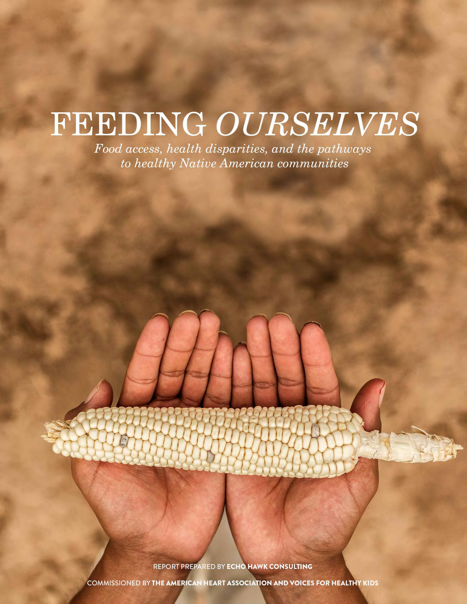Robert Wood Johnson Foundation Funds Tribal Food Policy Study
FAYETTEVILLE, Ark. — The Robert Wood Johnson Foundation has awarded a $189,983 grant to the Indigenous Food and Agriculture Initiative, based in the University of Arkansas School of Law, to study the link between tribal food policy and community health.
The study will analyze the effects of tribal food policy on community health, diet and food access in tribal communities. Data compiled in the study will be available for tribal governments to use in guiding future food policy decisions.
“Tribal nations are moving toward reclaiming healthy food access and food production, and an important part of exercising this sovereign power is through policy development,” said Janie Simms Hipp, the initiative’s director.
Researchers will study how tribal communities use food sovereignty assessments and analyze current and historic food systems to determine the effectiveness of federal feeding programs and local tribal laws and policies in reducing food insecurity, and improving food systems and health in tribal communities.
Crystal Echo Hawk (Pawnee) of Echo Hawk Consulting, Wilson Pipestem (Otoe-Missouria) of Pipestem Law, and Valerie Segrest (Muckleshoot) of the Muckleshoot Food Sovereignty Project are key partners in this effort.
Echo Hawk has nearly 18 years of social justice experience in Indian Country and was instrumental in publishing “Feeding Ourselves,” an examination of the challenges Native Americans face in accessing healthy food. Pipestem, an attorney and sovereignty advocate, has dedicated his career to assisting tribal governments to increase sovereign authority on tribal lands and expand tribal land bases. Segrest, a nutritionist and project coordinator for the Muckleshoot project, works to educate others about the importance of a traditional, nutrient-rich diet. She co-authored the 2010 book Feeding the People, Feeding the Spirit.
The Robert Wood Johnson Foundation has committed to helping all Americans have an equal opportunity to pursue a healthier life. Funding is directed toward issues that include child and family well-being, the improvement of health coverage and health care systems, and the promotion of healthy communities and healthy weight among children.
obesity and Diabetes in indian country
The study of the linkage between tribal food policy and the health in tribal communities comes at a time when the health disparities related to food insecurity in Indian Country are at crisis levels.
According to the 2015 report “Feeding Ourselves,” Native Americans continue to suffer from serious health problems and their average life expectancy is nearly five years less than other Americans. In addition:
- More than 80 percent of Native American and Alaska Native adults ages 20 to 74 are overweight.
- Childhood obesity often exceeds 50 percent in tribal communities.
- Nearly 30 percent of Native American and Alaska Native adults are pre-diabetic.
- Nearly 50 percent of Native American and Alaska Native children will develop Type 2 diabetes.
- Higher incidences of obesity and diabetes lead to greater rates of related illnesses such as cancer, heart disease, amputations, strokes and other health traumas.
About the Indigenous Food and Agriculture Initiative: The initiative enhances health and wellness in tribal communities by advancing healthy food systems, diversified economic development and cultural food traditions in Indian Country. The initiative empowers tribal governments, farmers, ranchers and food businesses by providing strategic planning and technical assistance; by creating new academic and professional education programs in food systems and agriculture; and by increasing student enrollment in land grant universities in food and agricultural related disciplines.
LL.M. Program in Agricultural and Food Law: The first advanced law degree in agricultural and food law was founded at the University of Arkansas School of Law more than 30 years ago. The LL.M. Program in Food and Agricultural Law was also the first to offer a fully integrated opportunity for face-to-face and distance education options. With the LL.M. Program as the foundation, the University of Arkansas School of Law publishes the nation’s first student-edited specialized journal devoted to food law and policy issues and sustains outreach efforts such as the Indigenous Food and Agriculture Initiative and the Food Recovery Project, which connect academic scholarship with critical legal and policy issues.
About University of Arkansas School of Law: The University of Arkansas School of Law prepares students for success through a challenging curriculum taught by nationally recognized faculty, unique service opportunities and a close-knit community that puts students first. With alumni in all 50 states, the District of Columbia, two territories and 20 countries, it has been ranked among the top 10 "Values in Legal Education" by the National Jurist magazine for three consecutive years and is among the top 46 public law schools, according to U.S. News and World Report.
Contacts
Janie Simms Hipp, director (Chickasaw)
Indigenous Food and Agriculture Initiative
479-575-4699, jhipp@uark.edu
Erin Shirl, assistant director
Indigenous Food and Agriculture Initiative
479-575-6572, eshirl@uark.edu
Bryan Pollard, director of external tribal relations (Cherokee)
Indigenous Food and Agriculture Initiative
479-575-3765, bpollard@uark.edu
